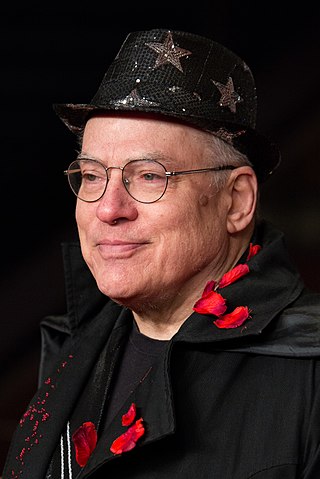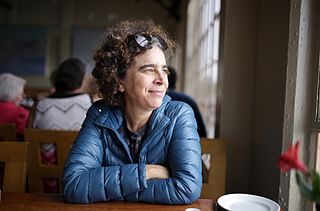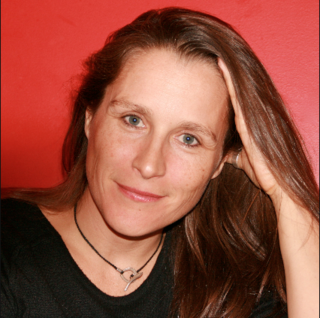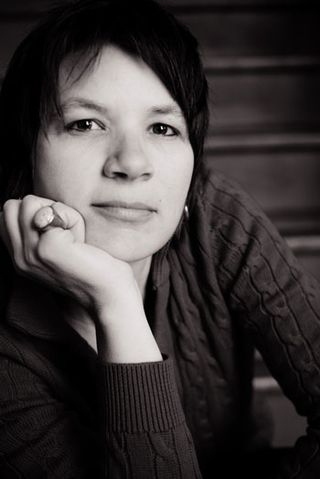
AIDS Coalition to Unleash Power is an international, grassroots political group working to end the AIDS pandemic. The group works to improve the lives of people with AIDS through direct action, medical research, treatment and advocacy, and working to change legislation and public policies.

Michael Weatherly Jr. is an American actor, producer, director, and musician, known for playing the roles of special agent Anthony DiNozzo in the television series NCIS and Logan Cale in Dark Angel (2000–2002). From 2016 to 2022, he starred as Dr. Jason Bull in Bull, a courtroom drama. He also starred in Meet Wally Sparks.

Marlon Troy Riggs was a Black gay filmmaker, educator, poet, and activist. He produced, wrote, and directed several documentary films, including Ethnic Notions, Tongues Untied, Color Adjustment, and Black Is...Black Ain't. His films examine past and present representations of race and sexuality in the United States. The Marlon Riggs Collection is open to the public at Stanford University Libraries.
Thomas A. DiCillo is an American film director, screenwriter, cinematographer, and musician.
Nancy Kates is an independent filmmaker based in the San Francisco Bay Area. She directed Regarding Susan Sontag, a feature documentary about the late essayist, novelist, director and activist. Through archival footage, interviews, still photographs and images from popular culture, the film reflects the boldness of Sontag’s work and the cultural importance of her thought, and received funding from the National Endowment for the Humanities, the National Endowment for the Arts, the Foundation for Jewish Culture and the Sundance Documentary Film Program.

Holger Bernhard Bruno Mischwitzky, known professionally as Rosa von Praunheim, is a German film director, author, producer, professor of directing and one of the most influential and famous queer activists in the German-speaking world. A pioneer of Queer Cinema and gay activist from the very beginning, von Praunheim was a key co-founder of the modern lesbian and gay movement in Germany and Switzerland. He was an early advocate of AIDS awareness and safer sex. His films center on queer-related themes and strong female characters, are characterized by excess and employ a campy style. They have featured such personalities as Keith Haring, Larry Kramer, Diamanda Galás, William S. Burroughs, Allen Ginsberg, Judith Malina, Jeff Stryker, Jayne County, Divine, Charlotte von Mahlsdorf and a row of Warhol superstars. In over 50 years, von Praunheim has made more than 150 films. His works influenced the development of LGBTQ+ movements worldwide.

Vito Russo was an American LGBT activist, film historian, and author. He is best remembered as the author of the book The Celluloid Closet, described in The New York Times as "an essential reference book" on homosexuality in the US film industry. In 1985, he co-founded the Gay and Lesbian Alliance Against Defamation (GLAAD), a media watchdog organization that strives to end anti-LGBT rhetoric, and advocates for LGBT inclusion in popular media.

Autism: The Musical is an independent documentary film directed by Tricia Regan. In April 2007, the film premiered at the Tribeca Film Festival in New York City. The film recounts six months of the lives of five children who are on the autism spectrum in Los Angeles, California as they write and rehearse for an original stage production.
Carol Leigh, also known as The Scarlot Harlot, was an American artist, author, filmmaker, sex worker, and sex workers' rights activist. She is credited with coining the term sex work and founded the Sex Worker Film and Arts Festival and was the co-founder of BAYSWAN, the Bay Area Sex Worker Advocacy Network.

Ellen Spiro is an American documentary filmmaker. She is a producer and director of the television documentary Are the Kids Alright?, which won an Emmy Award in 2005.

Greetings from Out Here is a 1993 road trip documentary film which captures the people, places and politics of gay America in the Deep South.

Thomas Allen Harris is a critically acclaimed, interdisciplinary artist who explores family, identity, and spirituality in a participatory practice. Since 1990, Harris has remixed archives from multiple origins throughout his work, challenging hierarchy within historical narratives through the use of pioneering documentary and research methodologies that center vernacular image and collaboration. He is currently working on a new television show, Family Pictures USA, which takes a radical look at neighborhoods and cities of the United States through the lens of family photographs, collaborative performances, and personal testimony sourced from their communities..
Fig Trees is a 2009 Canadian operatic documentary film written and directed by John Greyson. It follows South African AIDS activist Zackie Achmat and Canadian AIDS activist Tim McCaskell as they fight for access to treatment for HIV/AIDS. It was also inspired by Gertrude Stein and Virgil Thomson's opera Four Saints in Three Acts. The film premiered at the 59th Berlin International Film Festival where it won the Teddy Award for Best Documentary.
Ric Esther Bienstock is a Canadian documentary filmmaker best known for her investigative documentaries. She was born in Montreal, Quebec and studied at Vanier College and McGill University. She has produced and directed an eclectic array of films from investigative social issue documentaries like Sex Slaves, an investigation into the trafficking of women from former Soviet Bloc Countries into the global sex trade and Ebola: Inside an Outbreak which took viewers to ground zero of the Ebola outbreak in Zaire - to lighter fare such as Penn & Teller’s Magic and Mystery Tour.

Catherine Gund is an American producer, director, and writer who founded Aubin Pictures in 1996.
DiAna DiAna is an American hairdresser and HIV/AIDS activist from Columbia, South Carolina. Her work in the field of HIV/AIDS and basic sex education was featured in the 1989 documentary film Diana's Hair Ego.

Liz Marshall is a Canadian filmmaker based in Toronto. Since the 1990s, she has directed and produced independent projects and been part of film and television teams, creating broadcast, theatrical, campaign and cross-platform documentaries shot around the world. Marshall's feature length documentaries largely focus on social justice and environmental themes through strong characters. She is known for The Ghosts in Our Machine and for Water on the Table, for which she also produced impact and engagement campaigns, and attended many global events as a public speaker. Water on the Table features water rights activist, author and public figure Maude Barlow. The Ghosts in Our Machine features animal rights activist, photojournalist and author Jo-Anne McArthur.
Alan Chebot is an American film director and executive producer, born in Fall River, Massachusetts and raised in Somerset, Massachusetts.

Ayoka "Ayo" Chenzira is an independent African-American producer, film director, television director, animator, writer, experimental filmmaker, and transmedia storyteller. She is the first African American woman animator and one of a handful of Black experimental filmmakers working since the late 1970s. She has earned international acclaim for her experimental, documentary, animation, and cross-genre filmmaking productions. Her work, as well as her efforts as one of the first African American woman film educators, have led some in the press to describe her as a media activist for social justice and challenging stereotype representations of African Americans in the mainstream media.

International Sweethearts of Rhythm: America's Hottest All-Girl Band is a 1986 American independent short documentary film directed and produced by Greta Schiller and Andrea Weiss that presents a history of the International Sweethearts of Rhythm, the first racially integrated all-female jazz band in the United States.













